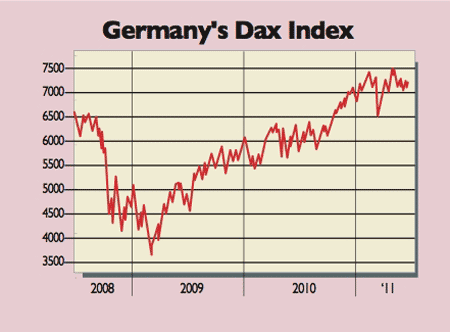
Germany’s blue-chip index, the Dax, has gained 75% since the autumn of 2008. But this year the benchmark index has largely moved sideways, while the next few months, reckons Handelsblatt, will be tough going. The Dax is one of the world’s most cyclical markets and highly geared to global growth. Over 50% of the index is made up of sectors sensitive to the economic cycle. Germany is a leading exporter and 66% of German firms’ revenues come from abroad.
The German manufacturing sector “has realigned its export portfolio to Asia and China in particular… this has allowed Germany to participate in the strong growth seen in Asia”, notes Morgan Stanley. Most German exports still go to Europe, but Asia is catching up fast. According to Bundesbank figures, exports to Asia totalled €41bn in the first quarter of this year, up from €25bn five years before.
This growing exposure to Asia gave the Dax added pep on the way up, says Wirtschaftswoche. Unfortunately, the opposite is also likely to be true. China is still fighting inflation, which has reached a 34-month high of 5.5%. Squeezing it out could lower growth from 11% to around 5%, reckons Ralf Borgsmüller of wealth manager PSM. And that would crimp much of Asia, where some countries now conduct over half their trade with China. But regardless of the magnitude of the eventual slowdown, the problem now is that earnings forecasts for Germany’s exporters are still factoring in the best of all possible worlds.
The Asian slowdown, then, could prove a particular handicap for the Dax. And there are plenty of problems it shares with other major indices. There has been a gradual global shift towards higher interest rates and tighter credit, says Wirtschaftswoche, which is never good news for stocks. Global data have disappointed and the US “is still far away from a sustainable economic recovery”.
Wall Street sets the global tone in stockmarkets, so when it wobbles the Dax will suffer too. With another round of money printing (QE3) looking unlikely just yet, US stocks will have to do without a further liquidity boost for now. Throw in the ongoing euro crisis, and many of the Dax’s quality stocks could soon be “considerably cheaper”, says Jens Ehrhardt of DJE Capital.